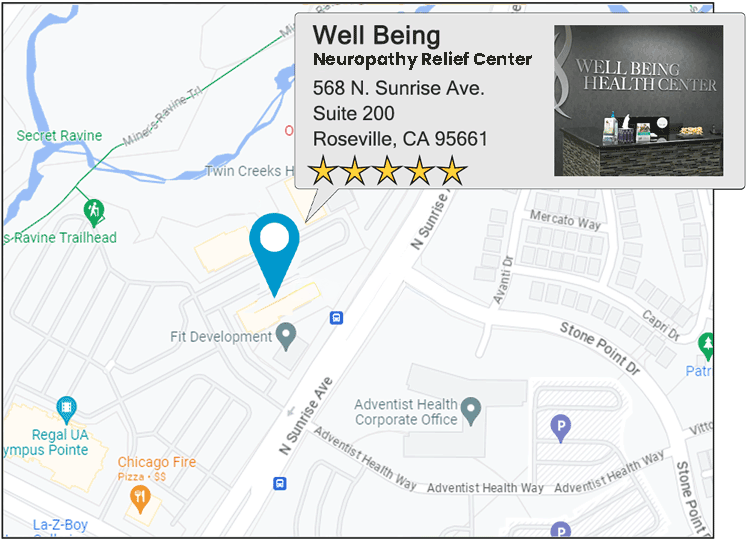Well Being Neuropathy Relief Center
Welcome to Well Being Neuropathy Relief Center in Roseville, your trusted center for neuropathy treatment. We specialize in helping patients with peripheral neuropathy rebuild and regrow damaged nerves through improved circulation, in-office therapies, personalized home therapies, and nutrition guidance. doctor and our patients are thrilled with the results our treatments produce, and we look forward to helping you manage your neuropathy at our Roseville office.
Peripheral neuropathy is a condition where nerves are damaged by underlying health issues such as diabetes, sciatica, complex regional pain syndrome, chemotherapy, or other causes. According to the National Institute of Neurological Disorders and Stroke, “An estimated 20 million people in the United States have some form of peripheral neuropathy” (ninds.nih.gov, 2018). Common symptoms include burning or stabbing pain, numbness, tingling, and sensitivity to touch.
At Well Being Neuropathy Relief Center, doctor offers expert neuropathy treatment in Roseville to help patients recover nerve function and reduce chronic pain, improving overall quality of life.
Ready to take the first step toward relief? Contact us today to schedule your consultation and start your personalized neuropathy treatment plan.
Why Choose Us For Your Recovery
We Are Highly Experienced
Our doctor, has helped thousands of people in Roseville and the surrounding areas find pain relief and recover from their peripheral neuropathy.
We Customize Your Care
Receive a full examination and diagnosis of your type of neuropathic pain or neuropathy followed by a customized treatment plan of comprehensive care.
Insurance Accepted
Depending on the type of insurance you have or the type of neuropathy, your insurance may cover your treatment. We are happy to verify benefits and help file insurance claims.
What Our Patients Are Saying
Listen to our patients share their experiences and find out why we are the top-rated neuropathy clinic in the Roseville area.
Suffering From These Symptoms?
Our treatments can relieve most chronic symptoms and conditions of neuropathy. See the symptoms below for more information.
Why Choose
Our Neuropathy Care
Our treatments have the following benefits:
- Helps prevent your body from destroying your nerves
- The process is simple and doesn't involve taking more medication
- Reduces burning or tingling sensations you may be experiencing
- Alleviates peripheral neuropathy effects
- Alleviates diabetic neuropathy symptoms
- Reduces balance issues caused by neuropathy
Meet Our doctor
Meet our physician that is ready to help you improve your peripheral neuropathy.
Dr. Brian Van Wagenen, DC
Chiropractor & Whole-Body Health Advocate
Frequently Asked Questions
Neuropathy involves an array of disorders, which occur when the nervous system experiences damage. Many refer to this condition as peripheral neuropathy, and it tends to be a result of damage to nerve axons. Neuropathy tends to cause pain and numbness in the hands and feet. It can be the result of traumatic injuries, infections, metabolic conditions, and exposure to toxins. One of the most widespread causes of neuropathy is diabetes.
Roughly 30% of neuropathy cases are considered idiopathic, which means they are of unknown cause. Another 30% of neuropathies are due to diabetes. About 50% of people with diabetes develop some neuropathy. The remaining cases called acquired neuropathies, have several possible causes, including trauma, nutritional deficiency, alcoholism, autoimmune diseases, poison exposure, and inherited disorders.
The symptoms of peripheral neuropathy differ based on the type you have and what part of the body is affected. Symptoms can vary from tingling in a specific body part to more severe ones like burning pain or paralysis. Other symptoms include, muscle weakness, cramps, muscle spasms, numbness in body parts, sleep disruptions, loss of balance, and loss of bladder control.<< /p>
Online Reviews
We know how good our comprehensive neuropathy care is, but we would prefer if you heard it from our patients.

Dr.Brian has been a life saver. I will try and make this short. I moved here from the Sf Bay Area a year ago with several repetitive use injuries. I am a semi retired hairstylist of 22 years and prior to that a pet groomer for 14 years. I had two amazing applied kinesiology chiropractors and one awesome massage therapist to keep me going with a thriving full time business. Working with injuries. You never really get to recover. So when I finally did choose to call it quits full time. I was at the point of surgery. Here's the list of my injuries Nerve impinging on both rotator cuff Disc on disc on c3-6 Four bone spurs on last of the top of the the t and beginning I to the lumbar, Tennis and golf elbow Neuropathy on the top half of both feet Achilles tendinitis some carpal tunnel issues. Basically a train wreck trying to avoid the knife I sought out an applied kinesiologist in Roseville and found dr.brian Him and the team did a thorough consultation plus xrays the xrays weren't good and confirmed everything I was dreading !! A few days after ,we started intense treatment 3-4 days a week. We use d supplements. His very skilled hands and a bunch of different therapies such as pulse and laser and neuro med. all of his equipment is costly and state of the art. Along with proven old school machines that work his staff are knowledgeable and super helpful they are in the back with patients quite a bit. I have never been in the waiting room for more than a few minutes without one of the staff coming up front. I am now down to once a week sometimes every other week dr Brian has saved me from impending surgery and has been healing me to the point where I can work part time without severe pain He is an expert at what he does he has many modalities my treatment always varied according to the testing he does before every treatment. He is a passionate healer. And committed to the people that come Into his office. And that's the all of it. I've been going to top notch chiropractors for years. I had my pick of the lot coming from San Jose and San Francisco some of the best dr.s around. And dr Brian got me off the ledge. I will. Continue treatment even when I'm all better just for maintenance and to be able to use all the amazing therapy equipment he's got in his practice. The pulse machine is amazingI oh. I should also note I've lost 35 lbs I'm not the easiest patient either. I drink I smoke and I'm overweight. And dr Brian still got me better on top of all my shortcomings Dr Brian is a true healer

My mom has been going here and has seen an immense amount of improvement in her legs/back. She suffers from neuropathy and can't say enough good things about the relief she has found. She has a pretty severe case and the Dr. here has given her top-notch treatment. She is a client for life! Thank you Well Being Chiropractic.

He helped moms leg neuropathy tremendously
*Disclaimer: Results are not guaranteed and may vary from person to person.



